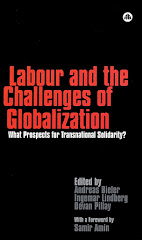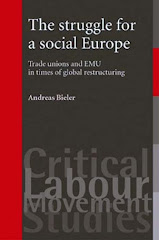The importance of a historical materialist approach
When analyzing exploitation and resistance during the current economic
crisis, it is essential to comprehend the historical specificity of capitalism.
While mainstream academic approaches take the separation of the political and
the economic, state and market as their unquestioned starting-point of investigation,
a historical materialist approach through its focus on the social relations of
production is able to acknowledge that this apparent separation is historically
specific to capitalism.
Unlike in feudalism, for example, exploitation is not based on direct
political enforcement. Rather, as a result of the social relations of
production being organized around wage labour and the private ownership of the
means of production, exploitation is indirectly imposed. Nobody is forced to
work for a particular employer. However, unless one owns the necessary means of
one’s own re-production, which hardly anyone does in capitalism, one is left
with no other option than to sell one’s labour power. As Marx made clear, it is,
therefore, the hidden abode of production, where exploitation takes place. In
short, in order to understand the historical specificity of capitalism and
comprehend the dynamics underlying exploitation, a historical materialist
approach is essential.
The structuring conditions of global capitalism
Class agency is important in determining the
future course of humanity. Nevertheless, while people do make their own
history, they do not do so in the circumstances of their own choosing. It is,
therefore, essential to conceptualise the structuring conditions of global
capitalism. In the article, I identify three key dynamics: (1) competitiveness and the focus on ever larger
amounts of profit; (2) the structural tendency towards crisis; and (3) the
outward expansive dynamic around uneven and combined development.
Organised around wage labour and the private ownership of the means of
production, capitalist social relations of production are enormously dynamic,
since both labour and capital have to reproduce themselves through the market.
While workers compete with each other to sell their labour ‘freely’, capitalists
are in constant competition with each other over profitability and market
share. Hence, capitalism is characterized by a constant drive towards further
innovation in order to outcompete one’s competitors. While capitalism is very
dynamic, however, it is also crisis prone, a second structural dynamic. The
more goods are produced the more profits are generated, looking for further
profitable investment opportunities, the more difficult it becomes to bring
together excess labour and excess capital in a fruitful way. A ‘crisis of
overaccumulation’ (David Harvey) ensues. Third, one way of overcoming crisis is
outward expansion. Nevertheless, the way non-capitalist spaces become incorporated
in this outward expansion is around dynamics of uneven and combined
development. Uneven in that new, peripheral areas are unlikely to catch up with
the development levels of core areas and combined in that further accumulation
in the core depends on exploitation in the periphery, while capitalist
development in the periphery is conditioned by development in the core. These
three structuring conditions of global capitalism, expressed differently in
different parts of the world at different times, need to be taken into account
when assessing class agency of resistance.
The centrality of class struggle
A focus on class struggle in the analysis of exploitation and resistance
does not mean that identities such as gender or ethnicity do not play a role.
However, neither gender nor racism is structurally essential features of
capitalism. Capitalist accumulation could continue perfectly well even if we
had complete gender and ethnic equality. Hence, when analyzing class struggle
in a broad way, it is essential to incorporate an analysis of how ethnic and
gender discourses are often incorporated by capital in class struggle in order
to fragment the working class.
In order to do this, class struggle needs to be understood broadly beyond
a focus on struggles at the workplace and the employee/employer relationship.
In the article, I put forward four different ways with examples of how a
broader analysis of class struggle could be conceptualized. This includes (1) Robert
Cox’s focus on the differences between established and non-established labour, (2)
Harry Cleaver’s emphasis on the importance of analyzing the whole ‘social
factory’ of capitalist reproduction including, for example, unpaid work at
home, (3) Kees van der Pijl’s focus on the extension of exploitation into the
sphere of social reproduction during the current neo-liberal phase of
capitalism, as well as (4) the ‘revised race-and-gender-conscious historical
materialism’ of Chandra Talpade Mohanty, who argues that analysis of capitalist
exploitation needs to be grounded in the experience of the most exploited
workers in the global economy, i.e. female workers, often working from home, in
developing countries.
In sum, class
struggle is the moment when agency meets structure, when labour meets the
structuring conditions of the capitalist social relations of production. Class
struggle is the process in which labour identities are formed and transformed.
It is the moment when structuring conditions are being confirmed or changed.
Hence, it is through the prism of class struggle that we can best analyse labour’s
responses to global restructuring. Whether different labour movements engage in
relations of transnational solidarity is not pre-determined by the structuring
conditions of the capitalist social relations of production, but ultimately
depends on the outcome of class struggle.
5 June 2014
Prof. Andreas Bieler
Professor of Political Economy
University of Nottingham/UK
Personal website: http://andreasbieler.net
5 June 2014















No comments:
Post a Comment
Comments welcome!